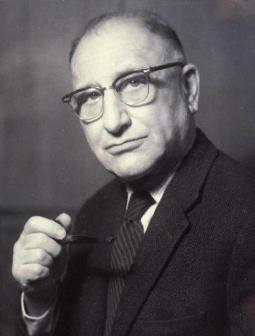Hans Popper
Hans Popper (November 24, 1903 – May 6, 1988) was an Austrian-American pathologist and hepatologist who is considered one of the founding figures of modern hepatology. His pioneering work in the study of liver diseases has had a lasting impact on the field of medicine.
Early Life and Education[edit | edit source]
Hans Popper was born in Vienna, Austria, where he completed his early education. He attended the University of Vienna, where he earned his medical degree in 1928. During his time at the university, he developed a keen interest in pathology and the study of liver diseases.
Career[edit | edit source]
After completing his medical degree, Popper worked at the University of Vienna and later at the Second Medical Clinic in Vienna. In 1938, due to the Anschluss and the rise of the Nazi regime, Popper emigrated to the United States.
In the United States, Popper joined the faculty at the Cook County Hospital in Chicago, where he continued his research on liver diseases. He later moved to Mount Sinai Hospital in New York City, where he served as the Director of Pathology and established one of the first liver research laboratories in the country.
Contributions to Hepatology[edit | edit source]
Hans Popper made significant contributions to the understanding of liver diseases, including cirrhosis, hepatitis, and liver cancer. He was instrumental in developing the field of hepatology as a distinct medical specialty. Popper's research helped to elucidate the mechanisms of liver injury and the progression of liver diseases.
He published numerous scientific papers and books on liver pathology and was a mentor to many students and researchers in the field. His work laid the foundation for modern diagnostic and therapeutic approaches to liver diseases.
Awards and Honors[edit | edit source]
Throughout his career, Hans Popper received numerous awards and honors for his contributions to medicine and hepatology. He was a member of several prestigious medical societies and served as the president of the American Association for the Study of Liver Diseases.
Legacy[edit | edit source]
Hans Popper's legacy continues to influence the field of hepatology. The Hans Popper Hepatopathology Society was established in his honor to promote the study of liver diseases and to support research and education in hepatopathology.
Personal Life[edit | edit source]
Hans Popper was married and had two children. He became a naturalized citizen of the United States and spent the remainder of his life in New York City, where he continued his research and teaching until his death in 1988.
See Also[edit | edit source]
- Hepatology
- Pathology
- Liver disease
- Mount Sinai Hospital (New York City)
- American Association for the Study of Liver Diseases
References[edit | edit source]
External Links[edit | edit source]
Search WikiMD
Ad.Tired of being Overweight? Try W8MD's physician weight loss program.
Semaglutide (Ozempic / Wegovy and Tirzepatide (Mounjaro / Zepbound) available.
Advertise on WikiMD
|
WikiMD's Wellness Encyclopedia |
| Let Food Be Thy Medicine Medicine Thy Food - Hippocrates |
Translate this page: - East Asian
中文,
日本,
한국어,
South Asian
हिन्दी,
தமிழ்,
తెలుగు,
Urdu,
ಕನ್ನಡ,
Southeast Asian
Indonesian,
Vietnamese,
Thai,
မြန်မာဘာသာ,
বাংলা
European
español,
Deutsch,
français,
Greek,
português do Brasil,
polski,
română,
русский,
Nederlands,
norsk,
svenska,
suomi,
Italian
Middle Eastern & African
عربى,
Turkish,
Persian,
Hebrew,
Afrikaans,
isiZulu,
Kiswahili,
Other
Bulgarian,
Hungarian,
Czech,
Swedish,
മലയാളം,
मराठी,
ਪੰਜਾਬੀ,
ગુજરાતી,
Portuguese,
Ukrainian
Medical Disclaimer: WikiMD is not a substitute for professional medical advice. The information on WikiMD is provided as an information resource only, may be incorrect, outdated or misleading, and is not to be used or relied on for any diagnostic or treatment purposes. Please consult your health care provider before making any healthcare decisions or for guidance about a specific medical condition. WikiMD expressly disclaims responsibility, and shall have no liability, for any damages, loss, injury, or liability whatsoever suffered as a result of your reliance on the information contained in this site. By visiting this site you agree to the foregoing terms and conditions, which may from time to time be changed or supplemented by WikiMD. If you do not agree to the foregoing terms and conditions, you should not enter or use this site. See full disclaimer.
Credits:Most images are courtesy of Wikimedia commons, and templates Wikipedia, licensed under CC BY SA or similar.
Contributors: Prab R. Tumpati, MD

